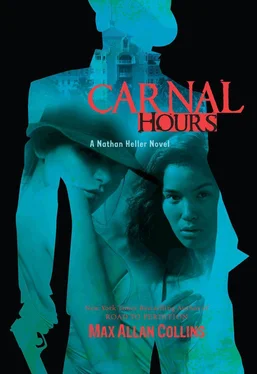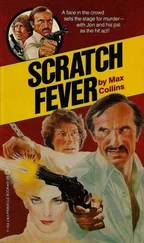Max Collins - Carnal Hours
Здесь есть возможность читать онлайн «Max Collins - Carnal Hours» весь текст электронной книги совершенно бесплатно (целиком полную версию без сокращений). В некоторых случаях можно слушать аудио, скачать через торрент в формате fb2 и присутствует краткое содержание. Жанр: Криминальный детектив, на английском языке. Описание произведения, (предисловие) а так же отзывы посетителей доступны на портале библиотеки ЛибКат.
- Название:Carnal Hours
- Автор:
- Жанр:
- Год:неизвестен
- ISBN:нет данных
- Рейтинг книги:3 / 5. Голосов: 1
-
Избранное:Добавить в избранное
- Отзывы:
-
Ваша оценка:
- 60
- 1
- 2
- 3
- 4
- 5
Carnal Hours: краткое содержание, описание и аннотация
Предлагаем к чтению аннотацию, описание, краткое содержание или предисловие (зависит от того, что написал сам автор книги «Carnal Hours»). Если вы не нашли необходимую информацию о книге — напишите в комментариях, мы постараемся отыскать её.
Carnal Hours — читать онлайн бесплатно полную книгу (весь текст) целиком
Ниже представлен текст книги, разбитый по страницам. Система сохранения места последней прочитанной страницы, позволяет с удобством читать онлайн бесплатно книгу «Carnal Hours», без необходимости каждый раз заново искать на чём Вы остановились. Поставьте закладку, и сможете в любой момент перейти на страницу, на которой закончили чтение.
Интервал:
Закладка:
But Adderley, knowing that Captain Sears would be testifying, did his best to deny the defense one of its bombshells.
“What would you say,” the prosecutor asked his witness, “if Captain Sears said he saw you out on the night of the murder?”
Christie’s knuckles were white at the railing as he summoned righteous indignation. “I would say he was seriously mistaken, and should in future be more careful of his observations.”
Adderley’s smile was wide and dazzlingly white; he nodded sagely, turned to the jury and played to them as he spoke to the bench: “My lord, that is all!”
This tactic from Adderley may have thrown Higgs somewhat, because at first his cross-examination of this uneasy witness seemed unsure. For example, he wasted five or ten minutes exploring which end of a towel Christie had used to wipe Sir Harry’s face, until Christie finally exploded with, “For heaven’s sake, Higgs, be reasonable!”
Yet Higgs pressed on, in an apparent attempt to convince the jury that Christie’s memory was unreliable. Fishing expeditions about why Christie had parked his station wagon in the country club lot that night, as well as whether or not the decision to stay at Westbourne was a spontaneous one, brought forth nothing. Nor did Higgs’ efforts pay off to underscore the absurdity of Christie’s claim that the stench of burning wasn’t present until he stepped into the murder room itself.
It was frustrating to see a sharp lawyer like Higgs do so little with an already off-balance witness.
Finally Higgs found his own footing.
“Mr. Christie, did you leave Westbourne at any time that night?”
“I did not.”
“Do you know Captain Sears, Superintendent of Police?”
“I do.”
“You are friendly with him?”
Christie shrugged. “I’m not friendly or unfriendly. I see very little of him.”
“Isn’t it true you’ve known each other since boyhood?”
Now he swallowed. “Yes.”
“He has no ill will against you, that you know of?”
“No.”
“I put it to you that Captain Sears saw you at about midnight in a station wagon in George Street!”
Christie swabbed his endless forehead with a soggy handkerchief. “Captain Sears is mistaken. I did not leave Westbourne after retiring, and any statement to the effect that I was in town that night is a very grave mistake.”
Higgs was pacing before the jury, now. “Would you say Captain Sears is a reputable person?”
“I would say so.” He swallowed again. “Nevertheless, reputable people can make mistakes.”
Higgs allowed the jury-in fact, the entire court room-to chew on the possible meanings of Christie’s last statement before saying, “I’ve finished with this witness, my lord.”
Over the rest of that day and extending throughout the next morning, Adderley continued to lay the foundation of his case. First came medical evidence from Dr. Quackenbush, much of which was centered on an unresolved discussion of whether or not Oakes was set afire alive or dead, based upon blister evidence. A little time-just a little-was given to the unsuccessful laboratory efforts to identify the “four ounces of thick and viscid” black liquid found in Sir Harry’s stomach.
The best moment came when the Chief Justice solemnly asked Dr. Quackenbush, “How long would it take for a normal, healthy person to die?”
And Quackenbush replied, “A normal, healthy person wouldn’t die, my lord.”
The tension in the courtroom disintegrated into much-needed laughter, over the cries of “Order! Order!” I found it a relief that the bland Quackenbush was finally living up to the Groucho Marx persona his name promised.
The afternoon of the second day found the pretty blond Dorothy Clark repeating the story of Freddie taking her, and the other RAF wife, Jean Ainslie, home in the rain; this innocent tale gave the Crown the element of opportunity it needed.
This testimony was hardly a surprise-and, had they called me, the prosecution could have got one Nathan Heller to back that up as well-but Higgs on cross took the opportunity to punch a major hole in the other side’s boat.
After establishing that Mrs. Clark had seen de Marigny burn himself lighting candles, helping explain the notorious singed hairs Barker and Melchen claimed to have found, Higgs asked, “Did you see the accused, Alfred de Marigny, taken upstairs at Westbourne for questioning the morning of July nine?”
“Yes I did.”
“I put it to you-was it between eleven a.m. and twelve noon?”
“Yes, I’m certain it was.”
The murmur that swept the courtroom was an indication of how damaging this testimony was. One of the prosecution’s own witnesses had now established that Freddie could have left his fingerprint on that Chinese screen by touching it on the 9th of July. At the same time, this witness called into doubt the reliability of sworn police testimony.
This moment of victory was followed by hours of attack, as a succession of prosecution witnesses painted a grimly unflattering portrait of Freddie.
Dr. William Sayad of Palm Beach told of the quarrel between Sir Harry and Freddie, in which Freddie had threatened to “bash Sir Harry’s head.” The smooth Southerner who had gotten me into this-Walter Foskett, the Oakes family attorney-detailed various family squabbles, making Freddie look as bad as possible.
Appearing as the absent Colonel Lindop’s surrogate, Major Pemberton-a proper, mustached figure with an air of authority-presented the police version of the investigation leading to de Marigny’s arrest-backing up the unavailable Lindop’s own deposition, which incidentally mentioned nothing about what time Freddie may or may not have been taken upstairs for questioning by Melchen on the 9th.
Lieutenant Johnny Douglas-a jaunty Scotsman with a hawklike profile, impeccable in his khaki uniform-had been assigned to stay with de Marigny, keeping him under informal guard, prior to the Count’s arrest. As he and Freddie were friends, the accused had apparently let his guard down, asking Douglas if a man could be convicted in a British court solely on circumstantial evidence, particularly if the murder weapon was not found.
In his rolling burr, Douglas also claimed Freddie had said of Oakes, “That old bastard should have been killed anyhow.”
Higgs handed the cross to his young second chair, Callender, oval-faced, handsome, slightly overweight but light on his feet as he asked Douglas, “You do understand the accused is a Frenchman, and that the French have different laws than the British?”
“I understand so.”
The Chief Justice sat forward and posed his own question. “Were you aware the accused came from Mauritius?”
“Yes, my lord.”
Callender smiled tightly. “And didn’t the accused ask whether the murder weapon had been found?”
“I believe he did.”
“Now, under the circumstances, wasn’t it a perfectly normal question for him to ask? If a man could be convicted without the weapon?”
“Not an unusual question, no, sir.”
“And did you not say to the accused, ‘They are making a fuss about Sir Harry because he has dough. If it had been some poor colored bastard in Grant’s Town, I would not have to work so hard’?”
“I don’t recall saying any such thing.”
“Don’t you frequently use the expression ‘bastard’?”
“I seldom ever use that word.”
Callender’s smile was gone; he thrust a finger at the dapper little Scotsman. “I put it to you, Lieutenant Douglas, that ‘bastard’ is a favorite term of yours!”
“I deny it.”
“And I further put it to you that you were the one who said, ‘That old bastard should have been killed anyway.’”
Читать дальшеИнтервал:
Закладка:
Похожие книги на «Carnal Hours»
Представляем Вашему вниманию похожие книги на «Carnal Hours» списком для выбора. Мы отобрали схожую по названию и смыслу литературу в надежде предоставить читателям больше вариантов отыскать новые, интересные, ещё непрочитанные произведения.
Обсуждение, отзывы о книге «Carnal Hours» и просто собственные мнения читателей. Оставьте ваши комментарии, напишите, что Вы думаете о произведении, его смысле или главных героях. Укажите что конкретно понравилось, а что нет, и почему Вы так считаете.












